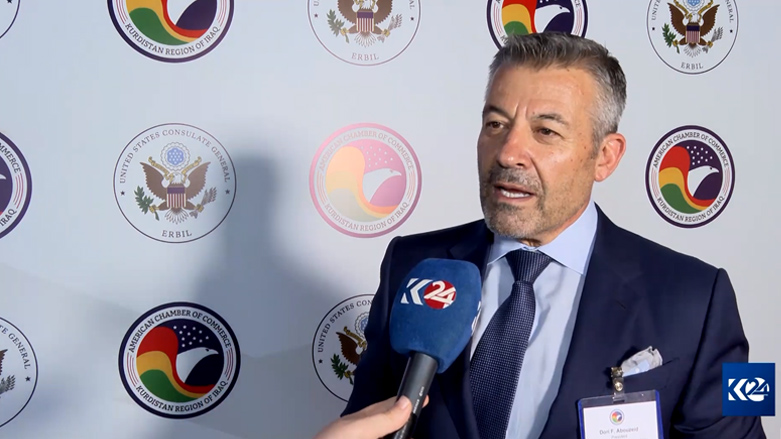PM Masrour Barzani diversifying the Kurdistan Region economy, says AmCham President

ERBIL (Kurdistan 24) – Through promoting agriculture, the Kurdistan Region Prime Minister is diversifying the Region's economy, President of the American Chamber of Commerce in Kurdistan Dori Abouzeid told Kurdistan 24 on Sunday.
Abouzeid’s remarks to Kurdistan 24 came during a reception held by the business association and the US Consulate General in Erbil to welcome a US Chamber of Commerce delegation, consisting of investors in the agricultural sector, to Iraq’s Kurdish region.
In response to a question by Kurdistan 24’s Shayma Bayiz on the motives behind the delegation’s visit to Kurdistan Region, the business official said the visit was in response to Prime Minister Masrour Barzani’s calls for investments in the Region’s agricultural sector.
“His Excellency Prime Minister Masrour Barzani is promoting the agriculture in Kurdistan Region. He is diversifying the economy,” he said.
Dubbed “Farm to Fork”, the American business delegation consists of over 12 companies and more than 20 businesspeople that work in the food value chain system, including processing, storage, and restaurants and shelves, according to Steve Lutes, the US Chamber of Commerce vice president for Middle East affairs, who is heading the over 10-day visit to the country.
Read More: Senior US Chamber of Commerce officials discuss US-Kurdistan Region trade ties with Kurdistan 24
“The other main reason [for the visit] is the safety in Kurdistan Region,” Abouzeid said, adding it is a “wonderful opportunity” for US companies to visit and invest in the Kurdish region.
However, the current delegation’s focus is on agriculture, it will not be the last of its kind, expected to be followed by similar delegations in various other sectors, he added.
To slash its heavy reliance on hydrocarbon revenues, the Kurdistan Regional Government (KRG) ninth cabinet has launched several initiatives to reform and develop the agricultural sector, including opening foreign markets to Kurdish farmers, Premier Barzani has said on many occasions.
The government oversaw the export of the first batches of Kurdish locally-grown pomegranates to a number of Gulf countries, including the UAE, Bahrain, and Qatar last year.
Other agricultural products such as apples, grapes, and honey are expected to be exported to Gulf and European markets in the future, according to government officials.
Regarding the number of US companies operating in the Kurdistan Region, the head of the business body said he did not have “specific data”, as numerous American franchises are working under local companies.
A former aviator, Abouzeid has been working in Kurdistan Region for 13 years, heading Macair Flight Support company, a VIP aircraft service provider.
“Kurdistan, with its rich agricultural heritage, holds tremendous potential for growth and development,” he said in his speech at the beginning of the reception, recalling the first agricultural community was formed in 10,000 BCE in the nowadays Chamchamal district in Sulaimani.
Known as AmCham, the business association aims to act as a conduit between the US and Kurdistan Region businesses and executives as well as promote American commercial interests in the Kurdish region.
In a bid to improve the business climate and facilitate investment, the KRG ninth cabinet has recently launched its online Business Registration System. This slashes the cost of company licensing by over 80 percent, according to government officials.
Representatives of the Kurdish Region frequently tout the Region’s investment-friendly laws and how they have played a crucial role in developing its infrastructure rapidly compared to the rest of the country.
Additional reporting by Kurdistan 24 Erbil reporter Shayma Bayiz
